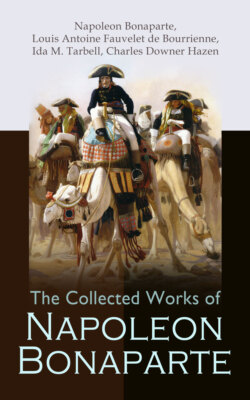Читать книгу The Collected Works of Napoleon Bonaparte - Charles Downer Hazen, Louis Antoine Fauvelet de Bourrienne - Страница 186
На сайте Литреса книга снята с продажи.
ОглавлениеNo. 4.
November 14th.—Third revolution at Constantinople. Mahmoud IV. assassinated (November 15th).
To the Empress, at Paris.
Burgos, November 14, 1808.
Matters here are progressing at a great rate. The weather is very fine. We are successful. My health is very good.
Napoleon.
November 23rd.—Battle of Tudela. Castaños and Palafox defeated, with loss of 7000 men and 30 cannon, by Marshal Lannes. "The battle of Tudela makes the pendant of that of Espinosa."—Napoleon.
No. 5.
To the Empress, at Paris.
November 26, 1808.
I have received your letter. I trust that your health be as good as mine is, although I am very busy. All goes well here.
I think you should return to the Tuileries on December 21st, and from that date give a concert daily for eight days.—Yours ever,
Napoleon.
Kind regards to Hortense and to M. Napoleon.
December 3rd.—French voluntarily evacuate Berlin.
December 4th.—Surrender of Madrid. Napoleon abolishes the Inquisition and feudal rights. ("He regards the taking of a capital as decisive for the submission of a whole kingdom; thus in 1814 will act his adversaries, pale but judicious imitators of his strategy."—Montgaillard.)
No. 6.
To the Empress, at Paris.
December 7, 1808.
Your letter of the 28th to hand. I am glad to see that you are well. You will have seen that young Tascher has distinguished himself, which has pleased me. My health is good.
Here we are enjoying Parisian weather of the last fortnight in May. We are hot, and have no fires; but the nights are rather cool.
Madrid is quiet. All my affairs prosper.
Adieu, dear.—Yours ever,
Napoleon.
Kind regards to Hortense and to M. Napoleon.
No. 7.
To the Empress, at Paris.
Chamartin, December 10, 1808.
My Dear,—Yours to hand, in which you tell me what bad weather you are having in Paris; here it is the best weather imaginable. Please tell me what mean these alterations Hortense is making; I hear she is sending away her servants. Is it because they have refused to do what was required? Give me some particulars. Reforms are not desirable.
Adieu, dear. The weather here is delightful. All goes excellently, and I pray you to keep well.
Napoleon.
No. 8.
To the Empress, at Paris.
December 21, 1808.
You ought to have been at the Tuileries on the 12th. I trust you may have been pleased with your rooms.
I have authorised the presentation of Kourakin to you and the family; be kind to him, and let him take part in your plays.
Adieu, dear. I am well. The weather is rainy; it is rather cold.
Napoleon.
No. 9.
December 22nd.—Napoleon quits Madrid.
To the Empress, at Paris.
Madrid, December 22, 1808.
I start at once to outmanœuvre the English, who appear to have received reinforcements and wish to look big.
The weather is fine, my health perfect; don't be uneasy.
Napoleon.
No. 10.
To the Empress, at Paris.
Benavento, December 31, 1808.
My Dear,—The last few days I have been in pursuit of the English, but they flee panic-stricken. They have pusillanimously abandoned the remnant of La Romana's army in order not to delay its retreat a single half day. More than a hundred waggons of their baggage have already been taken. The weather is very bad.
Lefebvre31 has been captured. He took part in a skirmish with 300 of his chasseurs; these idiots crossed a river by swimming and threw themselves in the midst of the English cavalry; they killed several, but on their return Lefebvre had his horse wounded; it was swimming, the current took him to the bank where the English were; he was taken. Console his wife.
Adieu, dear. Bessières, with 10,000 cavalry, is at Astorga.
Napoleon.
A happy New Year to everybody.
No. 11.
To the Empress, at Paris.
January 3, 1809.
My Dear,—I have received your letters of the 18th and 21st. I am close behind the English.
The weather is cold and rigorous, but all goes well.
Adieu, dear.—Yours ever,
Napoleon.
A happy New Year, and a very happy one, to my Josephine.
No. 12.
To the Empress, at Paris.
Benavento, January 5, 1809.
My Dear,—I write you a line. The English are in utter rout; I have instructed the Duke of Dalmatia to pursue them closely (l'épee dans les reins). I am well; the weather bad.
Adieu, dear.
Napoleon.
No. 13.
To the Empress, at Paris.
January 8, 1809.
I have received yours of the 23rd and 26th. I am sorry to see you have toothache. I have been here two days. The weather is what we must expect at this season. The English are embarking. I am in good health.
Adieu, dear.
I am writing Hortense. Eugène has a daughter.
Yours ever,
Napoleon.
No. 14.
To the Empress, at Paris.
January 9, 1809.
Moustache brings me your letter of 31st December. I see from it, dear, that you are sad and have very gloomy disquietudes. Austria will not make war on me; if she does, I have 150,000 men in Germany and as many on the Rhine, and 400,000 Germans to reply to her. Russia will not separate herself from me. They are foolish in Paris; all goes well.
I shall be at Paris the moment I think it worth while. I advise you to beware of ghosts; one fine day, at two o'clock in the morning.
But adieu, dear; I am well, and am yours ever,
Napoleon.
